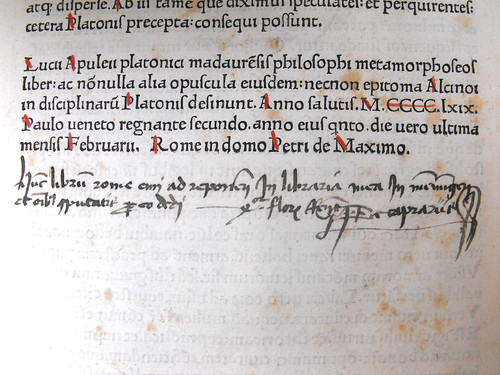Apuleius Madaurensis, Lucius: Opera.
Edited by Johannes Andreas de Bussis, bishop of Aleria. Add: [Pseudo-] Aristoteles: De mundo, translated by Apuleius. Hermes Trismegistus: Asclepius, translated by Apuleius(?). Alcinous: Epitome disciplinarum Platonis, translated by Petrus Balbus.
Rome: In domo Petri de Maximis [Conradus Sweynheym and Arnoldus Pannartz], 28 Feb. 1469.
Fol. [16 2-1410 15-1612 1710 188]. [178] leaves, 160 and 178 blank.
ISTC ia00934000; GW 2301; Goff A934; BMC IV 6 (IB. 17116); Bod-inc A-369; CIBN A-492; BSB-Ink A-658.
‘De mundo’ is the Latin reworking by Apuleius of the Pseudo- Aristotelian tract. The attribution to Apuleius of the translation of Asclepius is queried by CIBN (A-492). The ‘Epitome disciplinarum Platonis’ has often been ascribed to Albinus Platonicus, but recent scholarship supports an attribution to Alcinous (cf. Bod-inc A-151).
| GIP number: | A73 |
| Shelf-mark: | Sp Coll Hunterian Be.1.14 (see main library entry for this item) |
| Provenance: | Petrus Mitte de Caprariis (d. 1479), Preceptor of the Antonine monastery in Memmingen from ca. 1442-1479: on 18/7v (f. 177v) “Hu[n]c libru[m] rome emj ad reponen[dum] in libraria mea in Me[m]mi[n]gen et o[mn]ib[us] [com]putatis p[ro] eo dedj - 4or flor[enos] Ren[enses] F. P(?) de Caprariis.” Irsee, Bavaria, Benedictines, S. Maria (suppressed 1802): on 1/1r “Ad Bibliotheca[m] Vrsinens[em] maiore[m]”. Edward Harley (1689-1741), Lord Harley; from 1724 2nd Earl of Oxford: see Binding. Thomas Osborne (d. 1767), bookseller: purchased all the Harleian printed books; no. 5356 in his 'Catalogus bibliothecae Harleianae', vol. 1 (London: 1743) and no. 1169 in his 'Catalogus bibliothecae Harleianae', vol. 3 (London: 1744); Osborne’s price in pencil on front flyleaf “£5-5-0”. Louis Jean Gaignat (1697-1768), Secretary to King Louis XV: Gaignat sale, 1769; lot 2125 in Guillaume de Bure, 'Bibliographie instructive: supplément ... ou catalogue des livres de feu M. L.J. Gaignat', 2 vols (Paris: 1769). NB according to the Bibliothèque Méjanes annotated copy (Res. O. 189) of the Gaignat sale catalogue, Gaignat bought the book for 260 livres. William Hunter (1718-1783), physician and anatomist: purchased by Hunter at the Gaignat sale through his agent, Jean-Baptiste Dessain, for 215 livres 1 sou; see 'Dessain-Hunter correspondence' (University of Glasgow Library, MS Gen. 36, f.25v). University of Glasgow: Hunterian bequest 1807. |
| Binding: | Scotland, ca.1984, bound by Ian Maver (restoration binder, Special Collections Department, University of Glasgow Library) in quarter pigskin, plain bevelled oak boards, with new parchment pastedowns and new paper flyleaves. Size: 349 x 244 mm. Replacing an 18th-century gold-tooled red goatskin binding, bound for Lord Harley by Christopher Chapman. The Harleian binding is now preserved separately (together with original 18th-century marbled endpapers and flyleaves) as the covers of a blank book. On both covers triple fillets form a frame, within which is a floral roll (Nixon, ‘Harleian bindings’, pl. 13), and an ornamental roll (Nixon, ‘Harleian bindings’, pl. 14, Chapman roll 5). Both covers are decorated with a lozenge-shaped centre-piece, made up of several individual tools including Nixon, ‘Harleian bindings’, pl. 15, Chapman nos 3, 5, and 11. The head and foot of the spine are decorated with a smaller version of Nixon, ‘Harleian bindings’, pl. 14, Chapman roll 2 (as are the edges and turn-ins), and the spine compartments are decorated with several individual tools including Nixon, ‘Harleian bindings’, pl. 15, Chapman no. 9. Size: 348 x 245 mm. |
| Leaf size: | 335 x 227 mm. |
| Annotations: | Very occasional traces of early signatures in red and in brown ink. Page of bibliographical notes (loosely inserted) referring to T.F. Didbin’s ‘Introduction to the knowledge of rare and valuable editions of the Greek and Latin classics’. |
| Decoration: | Several principal initials supplied in red and blue with elaborate pen-decoration; many other initials supplied in red or blue; capital strokes supplied in red throughout; a few paragraph marks supplied in red or blue; running book numbers and headings supplied in red or blue throughout; rubrics added in red. |
| Imperfections: | Wanting 8/6 (f. 72) and the final blank leaf. |








